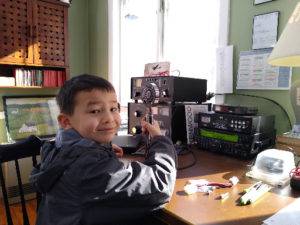Ham radio for beginners.

When the phone is down, and you can’t access the internet, power is out and 911 is overloaded – how do you communicate? When all else fails?
Ham Radio.
In disaster scenarios, you cannot rely on mobile phones or the internet to communicate in an emergency, because these communication channels rely on our electrical and data grid.
The number one reason for preparedness minded people to consider Ham Radio is its reliability during times of crisis. Since the early 1900s, this form of communication has reliably made it through every major crisis, disaster, and emergency situation with flying colors. When all other forms of communication fail, Hams are often the ones who are called upon to help communicate in and out of the disaster zone.
Fema and the Red Cross uses and rely on local hams to provide communication information to the people.
CB’s and cheap walkie-talkies aren’t very useful in survival scenarios.
Amateur radio – also known as ham radio is the best overall way to be prepared to keep in contact during an emergency.
Ham has been around for over 100 years, with 750,000 licensed operators in the US and six million around the world.
You will need a license from the FCC to use a Ham radio. You can easily prepare for the test in just a few days using free online resources like what we have listed below. The test is usually $15.
Contact us for more information. The following recommendations were from some of our test takers at Lakes Region Repeater Association.
__________________________
Classes:
Nashua Area Radio Society License Class
Study Aids:
Ham Radio Exam (recommended by member Cody)
Ham Radio Crash Course (you tube) (recommended by member Tyler)
HamStudy.org (recommended by member Tyler)
roland.anders@comcast.net (recommended by member Mary.) She says:
“The best and most expedient way to find out about the licensing classes is to email Rol Anders K3RA directly. He’s very responsive. Tech, General, and now this current Extra are all recorded and are up-to date. Having the License Manual is necessary. It’s very, very, very well presented. Follows the manual, in depth teaching, opportunities to ask questions in the ‘chat.'”
ARRL’s Ham Radio License Manual (recommended by member Ralph. He used this manual to pass his technician test. )
Ham Radio for Dummies (Recommended by member Ralph.) He says: “This is a good way to get your feet wet for a basic understanding of radio.”
Practice Amateur Radio Exams (Recommended by member Keith). He says: “You just have to refresh.”
Ham Radio School This was recommended by one of our test takers. (LRRA member)
No Nonsense Technician Class License Study Guide. (Rrecommended by member Keith) He says: “Easy to read and what you need to know. Then they throw questions at you.”
Ham Exam (Recommended by member Sharie)
Ham Study (Recommended by member Sharie) She says:“I aced all my exams using Ham Exam and Ham Study.”
Ham Radio – A Beginners Introduction to Amateur Radio. This video will wet your appetite! If you are looking for a rewarding and challenging hobby – then amateur “ham” radio is for you!
